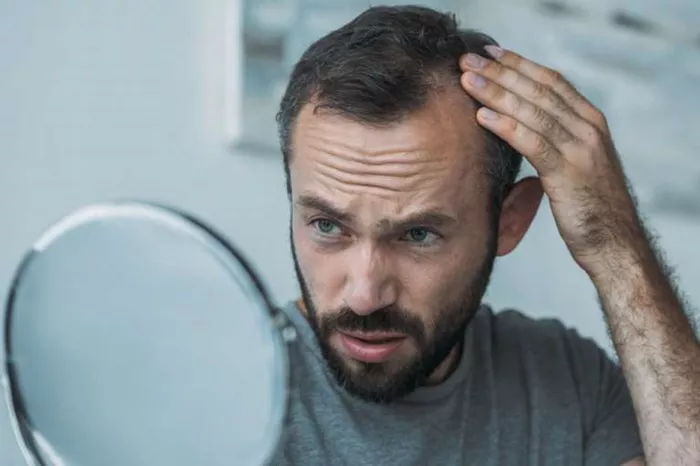Sepsis is a severe medical condition caused by the body’s response to infection. It can lead to tissue damage, organ failure, and death. Hair loss, a common aftermath of sepsis, occurs due to the physical and emotional stress of the illness. This type of hair loss is known as telogen effluvium, where hair prematurely enters the shedding phase.
Understanding Sepsis and Hair Loss
Identify the Cause
To stop hair loss after sepsis, identify the root cause. Stress, medication, and nutritional deficiencies are primary culprits. Consult a healthcare provider to determine if medications taken during sepsis contribute to hair loss. Blood tests can reveal nutritional deficiencies that need addressing.
Maintain a Balanced Diet
Nutrition plays a critical role in hair health. Include proteins, vitamins, and minerals in your diet. Foods rich in vitamins A, C, D, E, zinc, iron, and omega-3 fatty acids promote hair growth. Protein-rich foods like eggs, fish, and legumes are essential as hair is primarily made of keratin, a protein.
Hydrate Your Body
Proper hydration is crucial for overall health, including hair. Drink at least eight glasses of water daily to keep your scalp hydrated. A hydrated scalp supports healthy hair follicles and reduces hair breakage.
Reduce Stress Levels
Stress management is vital in stopping hair loss. Practice relaxation techniques such as meditation, yoga, or deep breathing exercises. Regular physical activity also helps reduce stress levels and improve overall well-being.
SEE ALSO: Can Alopecia Areata Be Caused by Stress?
Get Enough Sleep
Adequate sleep is essential for recovery and hair health. Aim for 7-9 hours of sleep per night. Good sleep hygiene, like maintaining a regular sleep schedule and creating a restful environment, can enhance sleep quality.
Gentle Hair Care Routine
Avoid harsh hair care practices. Use mild shampoos and conditioners suitable for your hair type. Avoid excessive brushing, heat styling, and chemical treatments that can damage hair. Gently pat your hair dry instead of rubbing it with a towel.
Scalp Massage
Regular scalp massages stimulate blood circulation to the hair follicles. This increased blood flow can promote hair growth and strengthen hair roots. Use natural oils like coconut, olive, or jojoba oil for scalp massages.
Consider Supplements
Supplements can help address nutritional deficiencies. Biotin, vitamin D, zinc, and iron supplements are known to support hair health. Consult a healthcare provider before starting any supplements to ensure they are necessary and safe.
Medical Treatments
In some cases, medical treatments may be necessary. Minoxidil (Rogaine) is a topical treatment that can promote hair growth. Prescription medications like finasteride (Propecia) may be considered for men. Platelet-rich plasma (PRP) therapy involves injecting your own blood plasma into the scalp to stimulate hair growth.
Consult a Dermatologist
A dermatologist can provide specialized care for hair loss. They can diagnose the specific type of hair loss and recommend appropriate treatments. Regular check-ups can help monitor progress and make necessary adjustments to your treatment plan.
Stay Patient and Positive
Hair regrowth takes time. It’s essential to remain patient and positive throughout the process. Consistent care and treatment can yield significant results over time. Celebrate small victories and focus on overall health and well-being.
Monitor Progress
Keep track of your hair loss and growth progress. Take photos and note any changes or improvements. This can help you and your healthcare provider assess the effectiveness of treatments and make necessary adjustments.
Avoid Hair Loss Myths
Many myths about hair loss can lead to ineffective or harmful practices. Avoid using unverified home remedies or over-the-counter products without consulting a healthcare provider. Stick to scientifically-backed treatments and advice.
Support Groups
Joining support groups can provide emotional support and practical advice from others experiencing similar issues. Sharing experiences and coping strategies can help alleviate stress and provide motivation.
Post-Sepsis Care
Continued post-sepsis care is crucial. Follow your healthcare provider’s advice for managing overall health and preventing future infections. A healthy body supports healthy hair growth.
Stay Informed
Stay informed about the latest research and treatments for hair loss. New advancements in medical science can offer improved solutions for managing hair loss after sepsis.
Embrace a Healthy Lifestyle
A healthy lifestyle supports hair health. Balanced diet, regular exercise, adequate sleep, and stress management contribute to overall well-being and hair growth. Avoid smoking and limit alcohol consumption as they can negatively impact hair health.
Conclusion
Hair loss after sepsis can be distressing, but with the right approach, it is manageable. Identify the cause, maintain a balanced diet, hydrate, reduce stress, get enough sleep, practice gentle hair care, consider supplements, seek medical treatments if necessary, consult a dermatologist, stay patient and positive, monitor progress, avoid myths, seek support, follow post-sepsis care, stay informed, and embrace a healthy lifestyle. Consistent care and attention to overall health can significantly improve hair growth and restore confidence.
You May Be Interested In

